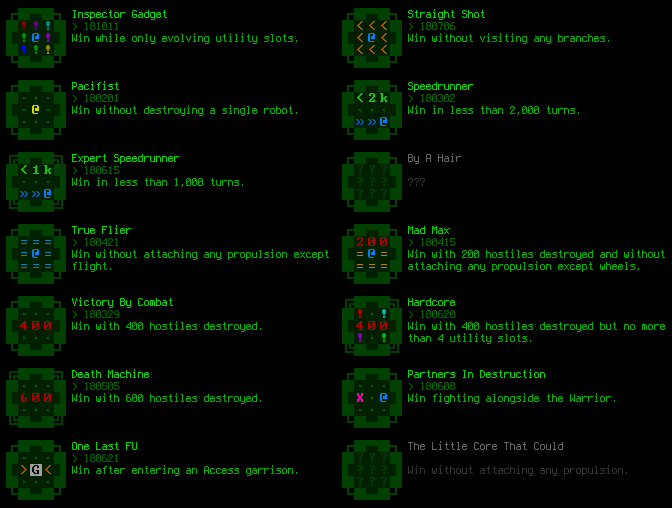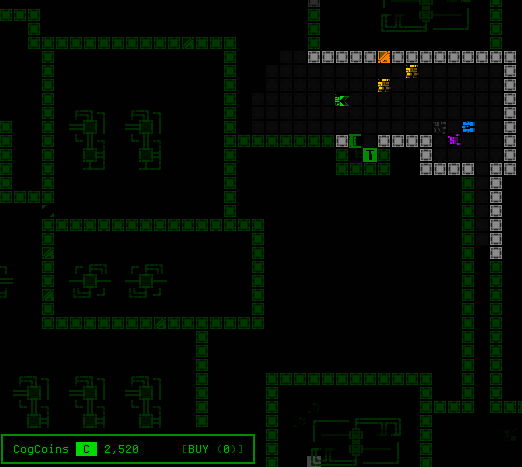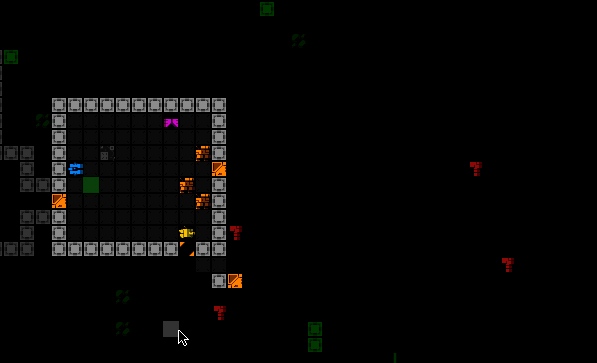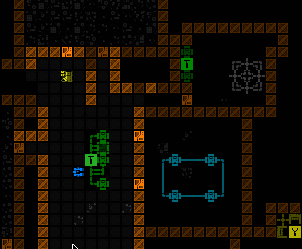Special game modes in the context of Roguelike
- Transfer

By their nature, games of the roguelike genre have a high replay value, but at the same time they can serve as an excellent foundation on which this replay value can be increased many times. Change a few variables here, add some content there, and you get a completely different game. Yes, probably not everyone will like it, but they don’t have to play it. But other people who like the alternative regime will receive a completely new way of interacting with a familiar world, or will perceive it as a new “challenge”.
The list of what I call "special modes" includes everything from time-limited events to "challenges" and new styles of passage. In fact, these are other ways to play the same game. Basically, these are methods that are explicitly codified by the game, but in this article we will consider non-codified ones.
Why do we need special modes?
There are good reasons for adding special modes to roguelike. Here are some of the benefits that I have discovered over many years of working on them:
- Value : as with any additional content, the new modes add value to the game in the eyes of the player. In addition, they add value to the community as a whole, because special regimes become another source of interaction: people share stories, brag about achievements or just discuss strategies.
- Replayability : special modes can make players explore completely new strategies in the context of the knowledge that they have accumulated during the game. New modes show the game from a different angle, making the replayable genre even more replayable.
- Training : looking at the game from a different angle, you can use some of the knowledge gained in the alternative mode to improve your skills in the main game.
- Experimentation : special modes allow players, and, more importantly, a developer, to experiment with new ideas that can even enter the main game - a new design in such modes can be used without serious consequences. Of course, this can be done in pre-release / beta release / early access, but the point is that for those who want to play them, these modifications can continue to live their own lives without affecting the game itself.
- Interlude : the developer sometimes takes a long time to release a major update. Instead of making players wait for something new, why not release a special mode for their entertainment? (You can also include postlude in this category - the ability to breathe new life into the game after the release of all or most of the updates and the "completion" of development)
- Efficiency : working with special modes as with “interludes” is simplified due to the fact that usually they are not so difficult to implement. With their help, you get a big "exhaust" in terms of the effort spent, reusing not only assets , as would be the case with the extension or DLC, but essentially reusing almost "the whole game" and slightly (or significantly) changing the gameplay in quite a short time. This adds value to the game with little effort.
Naturally, it’s more logical to add special modes to an existing and developing project, because it has more content and systems that you can work with. However, theoretically the same characteristics apply to any roguelike, large or small. Nevertheless, such modes are just additional goals, and if your base game is not ready yet, or at least does not yet have an exciting gameplay, then obviously you should first focus on it.
Examples
To demonstrate the above, let's look at the special special Cogmind modes that can take many forms.
Time limited events
Over the course of a couple of years, I have several times added special modes that start automatically at a specific time. Of course, players should have the opportunity to refuse and play the usual walkthrough, but I made sure that these modes do not turn on if the player has not tried several times and does not have any experience (or, in the case of one event, quite a lot of experience).
Many indie developers today create theme events dedicated to the holidays, but usually they are not very extensive and are mainly associated with a small replacement of content.
April 1st is a good option, because the topic can be a combination of something completely crazy, funny and unexpected. In addition, it has a consequence - people simply do not believe the news, but when someone finds out that the news is real, then this contradicts the disappointment from the often fake ads. I like to announce the first of April about the functions that actually appeared.
While I spent a couple of such events, starting in 2018 with Launcher Mode. This is a good example of how simple modifications can interestingly change the entire gameplay. In fact, this mode simply converts all the collected weapons into a random rocket launcher. Installations are powerful, but they spend a lot of resources and do not cope with all the difficulties, so the strategic avoidance of their shortcomings is a fairly new experience for players. In addition, players learn to use interesting types of weapons, which are less common in the usual passage.

An example of a part of the map where all items on April 1, 2018 were replaced with random rocket launchers.
The changes were made so quickly that in this mode a couple of shortcomings remained, for example, their weapons could still fall out of the first enemies, and thanks to this, they could arm themselves not with a rocket launcher, but soon after the release I fixed the main problems with a patch.
It took me only an hour from creating a concept to implementing and releasing it to develop this mode , and at first I didn’t even plan it, but literally in the morning of the first of April the player asked me about April Fool’s Day, and this gave me an idea (here is another reason active community - communication gives rise to new ideas). At the cost of a little effort, I got a serious advantage.
Unfortunately, I don’t know how many people actually played in this mode, because I decided to disable the downloading of indicators to the server so as not to litter the leaderboard with non-standard walkthroughs, but everywhere they started to publish news about this mode (and they even attracted the attention of new buyers), and it seemed interesting and funny to people, even if they did not play it.
Of course, the data on AFD (April Fools Day) could be sent somewhere, but then I didn’t think about it, besides, I didn’t have time to think over everything - I released the release on the same day!
However, in April 2019, I again released a special mode. This time I had both experience and a little time to prepare the redirection of the results of passing through this mode, so I managed to get user data and a separate table of records. There were few participants (42 players), because the results are entered in the table of records by choice, and the mode is also limited in time, but it was still interesting to look at the statistics of passing.

Cogmind Records Table on April Fools' Day 2019
Theme for AFD 2019 was Pay2Buy (Pay and Take) - players do not find or collect spare parts, but they save coins and buy items from Cogshop. There was even a market economy, loot boxes and even discounts!

Purchase items at Cogshop.
This, of course, did not take an hour of work, as in the case of AFD 2018.
It took me a week to design and create Cogshop and related mechanics, and I spent it with benefit. In accordance with the principle of “interlude” described above, this gave me the opportunity to post something new in the absence of regular releases. The last release was released 7 weeks before April 1, and now, 7 weeks later, the next release has not yet been released either (I'm still working on extremely time-consuming features), so yes, I really needed something in between.
In fact, Pay2Buy was not the first idea this year - until April 1, I experimented with turning Cogmind into a real-time game, but it seemed to me that for most players this would not be interesting, so I abandoned this idea. I talk about this mode and its design on Patreon (link only for sponsors).
Another important aspect of these “time limited” events is that I designed them so that they are also available afterdates of the event. Not everyone who would like to play it had the opportunity to do it on April Fool's Day, therefore, just as players can refuse events, they can select them on any other day (both parameters are controlled by a switch on the command line). In the case of the event of 2018, it was different - then I just advised “change the date in the system and start a new passage”, but forcing players to do this would be impolite. This year I added a mode switching function.
So, these event modes have become permanent parts of the game. They are quite simple and isolated, so they should not require additional maintenance in future versions, so I can probably provide access to them for all future customers.
Later last year, we held another time-limited event, the creation of which I approached in a completely different way: Limited Edition Holiday Mode 2018 .

Logo Cogmind Limited Edition Holiday Mode 2018
This event was held from December 20 to January 1, and its feature was the receipt of gifts.

A bunch of gifts are lying in the Landfill! Who could arrange this? ..

Go open them!
At the opening of each of the gifts, one or several items appeared, and very good ones, available right in the initial area. But not any good items, the main part was chosen among 17 completely new thematic holiday items, some of which had new mechanics (for details, see this announcement on the forum ).

Throw a piece of "Coal" next to the garrison and flee.
Some of the less special items were randomized, but the majority I manually selected for each for, in order to provide different gameplay due to various combinations. Of course, this took into account special days: Christmas Eve, Christmas and New Year. The most insane and bright thing I have saved for the new year:

Behold the RPDS!

Demonstration of RPDS: version of “now even more tiles”
Yes, it looks cool, but this weapon consumes resources very much, so using it is not so easy! Not to mention the fact that the complex begins to go crazy when you destroy such a part of it in a swoop, and this usually leads to problems. But still funny.
It seems that I had to work hard, although in fact I spent only two days! Honestly, it surprised me myself. I would have had to spend more time if I decided to provide the functions of this event with compatibility with future versions, but it was a really time-limited event, available in only one version of Cogmind. Therefore, I was able to quickly add content, without putting much effort into preparing for the possible long-term consequences of my decisions (as well as without bothering with well-organized scripts and code), as I usually do.
This allows you to identify one of the drawbacks of special modes: for them to work in future versions, you may have to support them with all the changes in the rest of the game, which takes time and sometimes is not worth it. Therefore, it is necessary to separate temporary, but large-scale modes and modes with a more limited set of functions, which in the future is easier to maintain with minimal effort.
Both AFD 2018 and Holiday Mode had a very large “exhaust”. This is less relevant to AFD 2019, but it was still worth it, because it was preserved in the game and became a rather interesting version of the gameplay.
Challenge Modes
Cogmind currently has 12 challenge modes. The space for design in their case is slightly narrower than that of time-limited events, which in themselves could be complex, but the main emphasis in them was on interest. Challenge modes - this is an optional way for a player to increase the level of complexity of the game with the help of various modifications. Several challenges can be activated at the same time, and each of them periodically rewards points for achieving goals. In addition, challenges allow the player to face other or unusual difficulties compared to standard walkthroughs.
I didn’t talk about them on the blog before, because on the whole I considered them as an “experimental” part of the game, although I posted a topic on the forum with updates to their content.
In fact, they can’t even be turned on through in-game menus, only through an external configuration file, but the “challenge” modes were properly integrated into the game using the achievements obtained by winning , and a separate table of records is kept for them.
Below is the current list of possible modes. These are just modes that I found difficult or that were easy to implement and worth experimenting with:
- Devolution : a player starts with a tripled number of slots for spare parts selected at random (from a weighted distribution), and loses a random amount with each new evolution, gradually turning from super-strong to extremely weak.
- Fragile Parts : all parts are destroyed upon removal, mimicking the standard behavior of processors.
- Gauntlet : all card exits are blocked except for the one farthest from the entrance.
- Inhibited Evolution : at each depth, the player evolves by half the number of slots (in fact, when passing, it turns out to be weaker).
- No Salvage : destroyed robots do not leave trophy parts, only matter (resource), which complicates the search for necessary / useful spare parts.
- Pure Core : there are no inventory slots throughout the walkthrough, there are only parts attached to the character.
- Scavenger : in the main complex there are no warehouses of random spare parts, and all single scattered items are damaged. Everything else must be collected from other robots, stolen from transporters or made.
- Simple Hacker : no indirect or manual hacking.
- Sticky Parts : No parts can be removed or replaced manually and must be destroyed to release the slots.
- Super Gauntlet : All card exits are blocked, the only way to go to the next depth is to find one unlocked garrison and fight it.
- Trapped : on most maps, there are 10 times more traps with an increased probability of triggering, and most methods for learning about traps are not available.
- Unstable Evolution : There is no control over the evolution of slot types that occurs randomly.

Random damaged parts scattered on the map in Scavenger Challenge mode.

In Simple Hacker mode, the manual hacking option is disabled.
(Images from other challenge modes, as well as new ideas and discussions can be viewed on the forum. In addition, the game manual has a more detailed description of the mechanic and points.)
It was actually quite easy to implement most of the above, and this is another way add value to the game and add new experience at a low cost.
Challenge modes are still part of the development. I added the latter a long time ago, but I still have dozens of ideas in this area (and many more were suggested by the players themselves). I just need to decide when to add new modes. I planned to create an in-game menu for access to them, releasing it and other functions in a separate release, however this is a time-consuming, but low-priority function, so I constantly postpone it.
Conducts
Conducts (also called “challenge games” or “walkthroughs”) have existed in many roguelike since the classic games. Conducts differ from Cogmind's so-called “challenge modes” in that the latter change the content or mechanics to create a challenge, and traditional conducts work inside the base game without any changes - they depend entirely on some kind of player’s restriction.
For example, in NetHack there are many optional conducts that can be read about in the wiki games .

Some of the conducts of a NetHack game are listed using the #conduct command.
Brogue also has conducts called feats. Their complete list is listed here .

The victory screen at Brogue, the player completed two conducts ( source ).
Unlike these examples, which are simply automatically recognized during a normal walkthrough, in Angband players essentially use some of the birth options as conducts , although there are not many of them - some roguelikes are more likely to create conducts than others.
Not all conducts are necessarily tracked by the game, many appear in the community of players and become "unofficial" conducts, challenges selected by many players, but not technically encoded in the game. Players independently impose certain restrictions or requirements.
NetHack also has a decent list of unofficial conducts(some of them are tracked by variations of the game, but not by the "vanilla" version), and ADOM also has many established informal conducts . Some of the achievements of ADOM gradually became "semi-official" - in the Steam version of the game, "achievements" are given for them.
Cogmind definitely has its own share of experienced players, imposing conducts on themselves, and even their “official” set, represented by the corresponding achievements. However, Cogmind achievements do not require Steam, codifies conducts and forces them to adhere only to the achievement system, and therefore, technically, each of them works only once(upon first receipt). Later I can expand this function so that they are recognized in any subsequent passage even after receiving an achievement, but I'm not sure about the value of this, because I have many other, more important functions. In addition, there are a lot of achievements, so players will still have something to do, performing new and different things, and not repeatedly achieving the same goal.
One difference is also worth noting here - traditionally conducts are more specific than many achievements that can be obtained even before winning the game. The Conduct is not completed until completion, so they are usually complicated and they are chosen by a minority of experienced winners to intentionally make roguelike even harder.
Cogmind currently has 256 achievements, but all conduct-related achievements can be attributed to the following subcategory:

Examples of Cogmind achievements in the UI.
There are also 12 achievements for winning in each challenge mode, but, again, they change the mechanics of the game, so I will not consider their conducts. And quite a few achievements of Cogmind require long-term conducts in one passage, but theoretically can be obtained before victory, therefore they also do not count.
Non Meta Conducts
The roguelike Conducts described above and common in the community are “meta-achievements” - optional challenges added on top of the game itself. Often they can be stopped at any point in time at the player’s choice, regardless of whether the game monitors this conduct.
But I believe that there is an interesting alternative category of conducts built into the gameplay.
A curious example of this is the god conducts of the Dungeon Crawl Stone Soup (DCSS). When you worship a certain god, he may expect from you that you will avoid certain actions, or reward piety for the performance of other actions. Obviously, this limits the player’s conduct, or at least affects him for most of the passage, unless the player decides to survive the consequences of the transition under the protection of another god.
You can see the list of DCSS gods here , it has links to more detailed information about each, and under the heading Deprecates the types of conduct that God expects from a player are listed.

A good example of a strict god is Chess from DCSS.
Most gods do not have many restrictions. They are more important about the actions that they expect from the player to give him piety and rewards. An interesting example here is Ru - a god who (large) rewards the player for choosing additional and permanent flaws (“personal sacrifices”), which essentially act as smaller conducts.
Cogmind also has some of these "built-in conducts" that are not related to the meta, but they are not related to the gods, but have a macro level. For example, you can permanently set RIFto get many useful abilities, but if you do so, you will be hated by two other factions, and you will lose the opportunity to use their help and abilities until the end of the passage.
There are many such long-term effects, however, unlike traditional
roguelike conducts that always act negatively, Cogmind usually (but not always) balances them with the player acquiring something else of a similar value in the process. Be that as it may, the effects are long-lasting, and some of them make certain areas or the entire passage more complicated.
Randomized Challenges
In addition to tradition, in the space of “special regimes” roguelike there are many opportunities for innovation.
One of the most interesting is the randomization of challenges. The roguelike genre is based on walkthroughs and has high replayability, therefore it is well compatible with this approach - you have a set of mini-challenges (changes in mechanics, objects, enemy behavior or the player’s character itself), and at the beginning of the passage the combination of such changes is collected in one challenge. Even without selectable changes, various combinations can create a very different gameplay, and very little work is required to support all of this.
It would be even better to create such a combination for the entire community in the form of daily / weekly challenges, which gives users more topics for discussion, and also allows you to maintain separate records tables.
I'm not sure if such a solution is suitable for Cogmind, given the large number of interconnected systems and the long-term influence of balance (compared to many roguelike it is a very carefully balanced game), however, the concept is definitely worth considering and even experimenting. It might be interesting!
Although combining several challenge modes is a good idea, I personally have very definite thoughts about what this regime should consist of: it is worth excluding changes from the pool of combined mini-challenges that introduce too little (or too much) new. I think that you need to change important game variables, such as the availability of items, drop-out trophies and the population of cards, add various permanent positive / negative effects, or even the ability to start in other parts of the world.
Be that as it may, I still have a lot to do, but maybe someday I will realize it.
